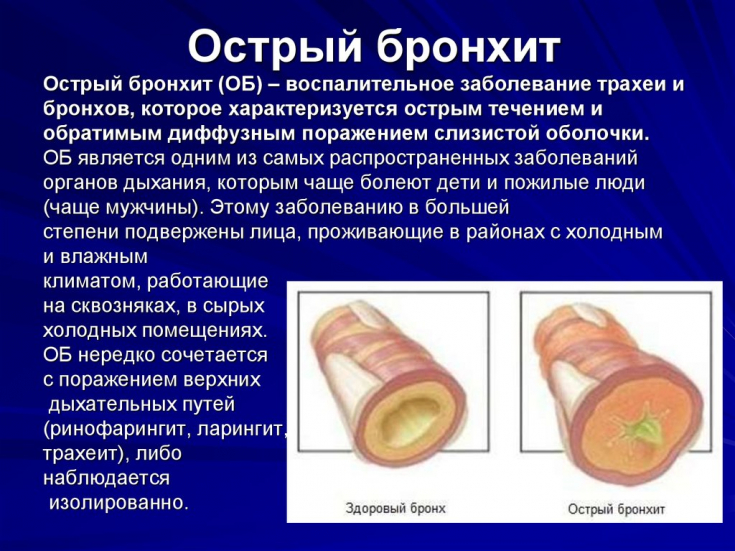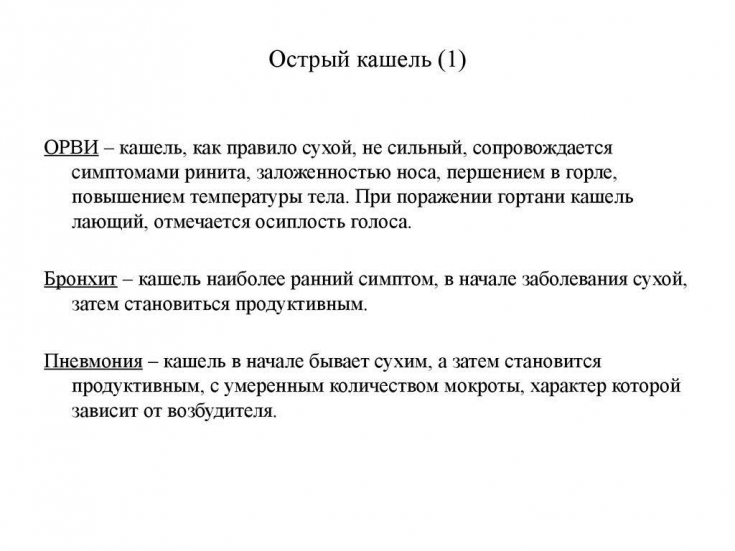Specialists of the National Institute for Health and Care Excellence & minus; NICE, within the limits of recommendations on treatment strategy, rational choice of antibacterial drugs and assessment of the condition of patients with acute bronchitis, the leading symptom of which is cough, analyzed evidence base for the use of prescription and over-the-counter drugs and treatment recommendations for this condition.
On the effectiveness of first aid medications for the treatment of acute bronchitis, read the article on estet-portal.com.
Effectiveness of drug treatment of cough in acute bronchitis
Based on the analyzed data, the experts recognized that the use of non-steroidal anti-inflammatory drugs (naproxen, ibuprofen) does not help to alleviate the manifestations of cough, therefore, these drugs are not recommended for use in the treatment of acute bronchitis. However, paracetamol and ibuprofen are often used in the treatment of patients with any associated pain syndrome and fever.
Follow us on Instagram!
The use of expectorants is justified in case of productive cough in acute bronchitis. Based on the evaluation, there is some evidence that the use of guaifenesin reduces the manifestations of cough in adults and adolescents with acute bronchitis or upper respiratory tract infections without simultaneously increasing the development of side effects.
Also, experts have confirmed that preparations containing guaifenesin can be prescribed in the treatment of acute cough for people over 12 years of age.
Guaifenesin and ipecac products cannot be used on children under 6 years of age.
What is the danger of infectious mononucleosis
Antitussives in the treatment of acute bronchitis
Analyzing the actual results of studies, it was found that the evidence for the use of dextromethorphan is inconsistent. Separate results indicated that a single dose of the drug at high doses in adults with a cough in acute bronchitis contributed to symptomatic relief.

At the same time, there is contrary evidence of ineffectiveness along with an increase in the incidence of side effects from the use of this drug (mainly from the gastrointestinal tract and dizziness). Therefore, the appointment of antitussives should be strictly individual and depend on the tolerance of the drug to the patient and its effectiveness.
Influenza pneumonia: do corticosteroids affect mortality
However, it must be remembered that there are strict indications for prescribing antitussives: acute and chronic respiratory diseases accompanied by a dry unproductive cough; irritating wet cough that disturbs the general condition and sleep of the patient; postoperative period, to eliminate cough syndrome after abdominal operations.
Cough preparations containing codeine should not be used in children under 12 years of age and are not recommended for use in persons under 18 years of age who have respiratory problems.
Features of prescribing bronchodilators in the treatment of cough in acute bronchitis
Based on the evidence, the experts agreed that bronchodilators such as oral or inhaled salbutamol do not improve overt symptoms, causing side effects such as tremors when given in acute cough therapy.

At the same time, in some cases, in individuals with a major respiratory disease (bronchial asthma) with acute bronchitis, the appointment of these drugs is necessary. Therefore, bronchodilators should not be used in the treatment of acute cough in persons without a confirmed underlying respiratory disease, particularly asthma.
Swollen cervical lymph nodes: correct diagnosis
Corticosteroids for acute bronchitis
The data on inhaled corticosteroid prescription were ambiguous. Separate results indicated that the use of these drugs contributed to the reduction of the manifestations of acute and subacute cough (especially in those patients who do not smoke).
At the same time, corticosteroids have a systemic (mineralocorticoid and glucocorticoid) effect. Therefore, the experts agreed that, given the potential risks and benefits, oral or inhaled corticosteroids should not be offered to patients (adults or children) with acute cough, including acute bronchitis.
Procalcitonin: a new course of antibiotic therapy
Antibacterial therapy for acute bronchitis of viral etiology
No evidence has been found for the need for antibiotics for acute cough associated with an upper respiratory tract infection, which is usually a viral infection.
Acute cough associated with an upper respiratory tract infection or acute bronchitis is generally considered to be self-limiting on the basis of this analysis. Most often, the etiological factor is a viral infection, and the prescription of antibiotics is impractical.
Therefore, based on the lack of evidence, the committee decided that antibiotics should not be given to adults and children with acute cough due to an upper respiratory tract infection.
Fever and coughing may be signs of pneumonia







Add a comment